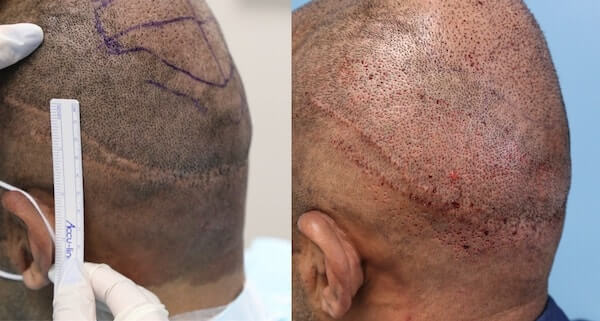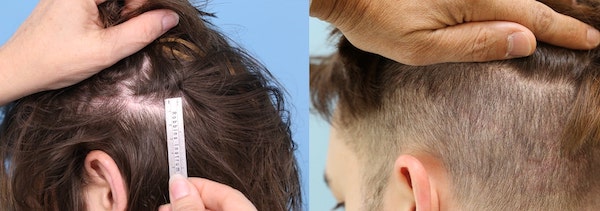Scalp Scar Revision
The feeling of excitement following a hair restoration procedure is often offset by the appearance of hair transplant scars that were the results of previous hair restoration techniques using older hair transplant technology. These older hair transplant techniques or other scalp procedures did not have the necessary technology to effectively address the appearance of scars after surgery. As a result, patients often had to wear their hair long on the back of their head in order to hide any scars that resulted from the original hair restoration procedures. The method used to perform a scalp scar revision surgery is primarily determined by the shape, size and location of the scar.
Why Are Scalp Scars Visible?
The size of the scar is the most obvious factor in making them visible to others and this is especially true if there is little hair surrounding the scar. The contrast of the area where the scar is located is also an important factor as the lack of hair in a scar that is surrounded by a good amount of hair density can cause the scar to greatly stand out to others.
Los Angeles Scar Revision Options
A scalp scar can be revised through a variety of methods that can even be combined for the best results. In addition, using cosmetics always has a place in revising a scar. Here are the most common methods used in revising a scalp scar:
- Simple scar revision
- Scar revision with trichophytic closure
- FUE hair transplants into the scars
- Scalp micropigmentation
- Cosmetics
Scar Revision and Trichophytic Closure
The procedure known as trichophytic closure minimizes the visibility of the scar and can often be accomplished using a simple scar revision surgery. Depending on how much stretching is involved with the existing scar, the scar will be removed and closure is performed. Trichophytic closure is done on just one edge of the scar or both sides of the scar. This procedure is helpful in bringing hair into the scarred area as well as making it blend in naturally with the area surrounding the scar. At times, a partial trichophytic closure is sufficient to bring an adequate number of hairs into the scar to make it look less visible.
FUE Hair Transplant into the Scar

Follicular Unit Extraction (FUE) can often be utilized in scalp scar revision in order to:
- Bring a greater amount of hair into the scar
- Remove or minimize the density of hair that surrounds the scar location
- Perform both tasks listed above
No matter which method is chosen by the surgeon, FUE hair transplant surgery minimizes the contrast between the scar area and surrounding scalp and can effectively improve the appearance of the scar.

SMP and Cosmetics
SMP is a method in which dermal pigments are inserted into the scalp or scar to darken the color of the area. This helps minimize the contrast of the scar with the surrounding areas. The use of cosmetics can do the same thing in terms of improving the visibility of the scars. Cosmetics used to cover scars are often referred to as cosmetic camouflage products and they must be used with great care. Toppik and other microfibers can conceal the scar by minimizing the contrast between the colors of the scalp scar and the surrounding hair.
Consulting with a board-certified, experienced hair transplant surgeon is the first step in revising the scalp scar. An experienced Los Angeles hair transplant surgeon, as well as hair restoration surgeons across the country, can review the various options with a patient as well as help the patient decide which revision option will best help them achieve their scar revision goals. If you want the best for a hair transplant on scar, give our office a call at (888) 302-8747
Video: Hair transplant scar revision with FUE implantation into the scar
Read the FAQ about Scalp Scar Revision